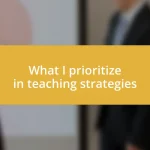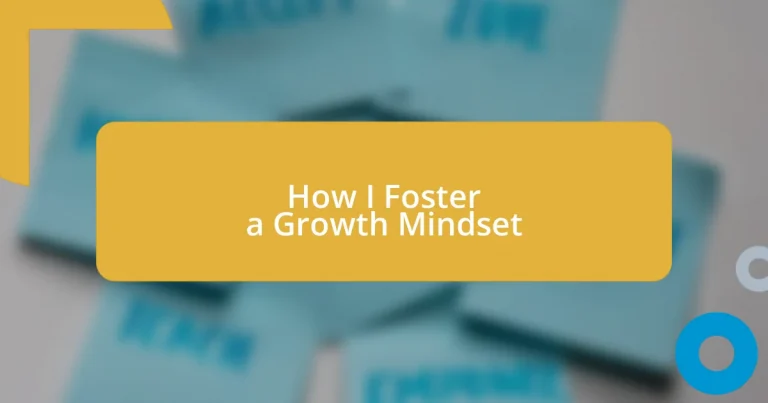Key takeaways:
- A growth mindset emphasizes that abilities and intelligence can be developed through effort, leading to resilience and love for learning.
- Adopting a growth mindset enhances self-esteem, collaboration, and problem-solving abilities by framing failures as opportunities for growth.
- Continuous self-reflection, surrounding oneself with a supportive community, and embracing lifelong learning are essential for maintaining a growth mindset long-term.
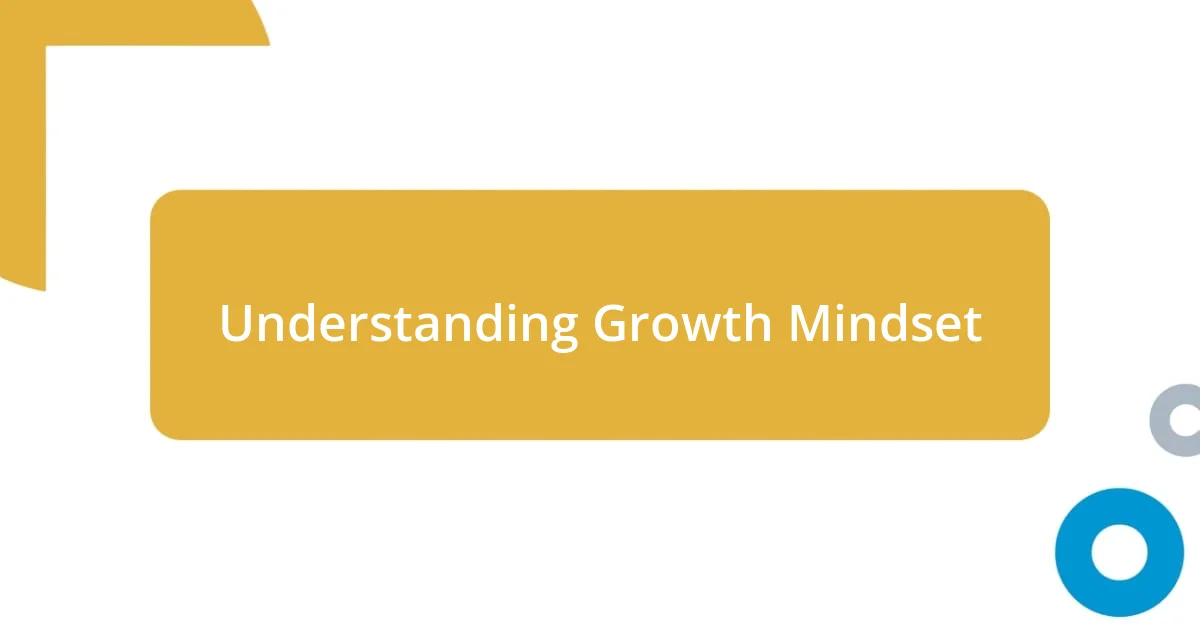
Understanding Growth Mindset
A growth mindset is the belief that our abilities and intelligence can be developed through dedication and hard work. I remember a time in high school when I struggled with math; instead of shying away from it, I decided to embrace the challenge. That pivotal choice not only improved my skills but also transformed my outlook on learning—what if setbacks are just stepping stones?
At its core, this mindset fosters resilience and a love for learning. One moment stands out—after failing a major exam, I felt crushed. Yet, upon reflection, I realized this gave me the opportunity to understand my weaknesses and to strategize how to improve. Have you ever faced failure and found unexpected growth hiding within it?
Understanding growth mindset means recognizing that effort leads to mastery. I often share with my friends how my enthusiasm grew when I learned to see challenges as opportunities. When I frame obstacles in this light, I can’t help but feel excited about what I can uncover in myself. How do you perceive your challenges?
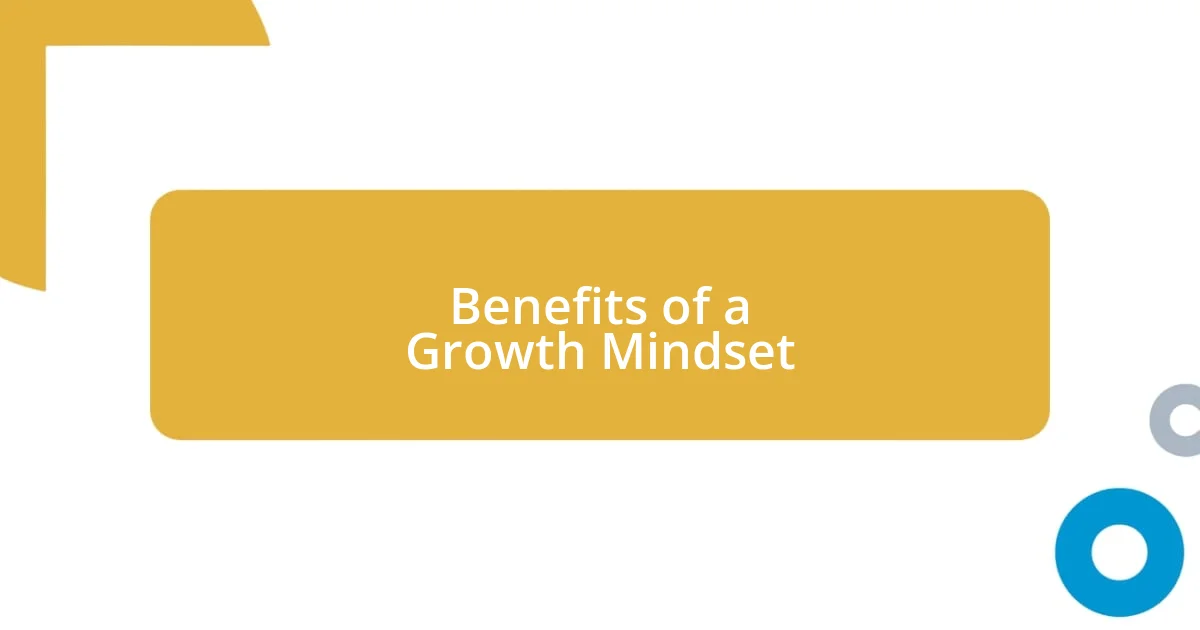
Benefits of a Growth Mindset
The benefits of adopting a growth mindset are manifold, stretching far beyond the individual. One immediate advantage I’ve noticed is the increased resilience we cultivate. The feeling of empowerment that comes with embracing challenges is exhilarating. For instance, when taking up a new hobby like painting, I found myself thoroughly frustrated at first. Yet, by focusing on progress instead of perfection, I grew more confident and discovered a hidden passion.
Embracing a growth mindset can enhance collaboration and relationships, as it encourages open communication and shared learning. I recall a project at work where differing opinions led to tension. By approaching our discussions with a mindset open to growth, we not only resolved our conflicts but also harnessed each other’s strengths. The result? A vibrant team dynamic that sparked creativity and innovation, transforming the way we tackled challenges together.
Finally, the long-term impact on our self-esteem cannot be overstated. By viewing failures as opportunities rather than setbacks, I have experienced a profound shift in how I regard myself. For example, after receiving constructive criticism on a project I was passionate about, I initially felt disheartened. However, I soon recognized this feedback as a crucial element for my growth, allowing me to improve and ultimately succeed in my endeavors. This shift in perspective not only built my confidence but also ignited a desire for continuous learning.
| Benefit | Description |
|---|---|
| Resilience | Increased ability to bounce back from setbacks and face challenges eagerly. |
| Collaboration | Enhances teamwork through open communication and mutual respect. |
| Self-Esteem | Builds confidence by framing failures as opportunities for growth. |
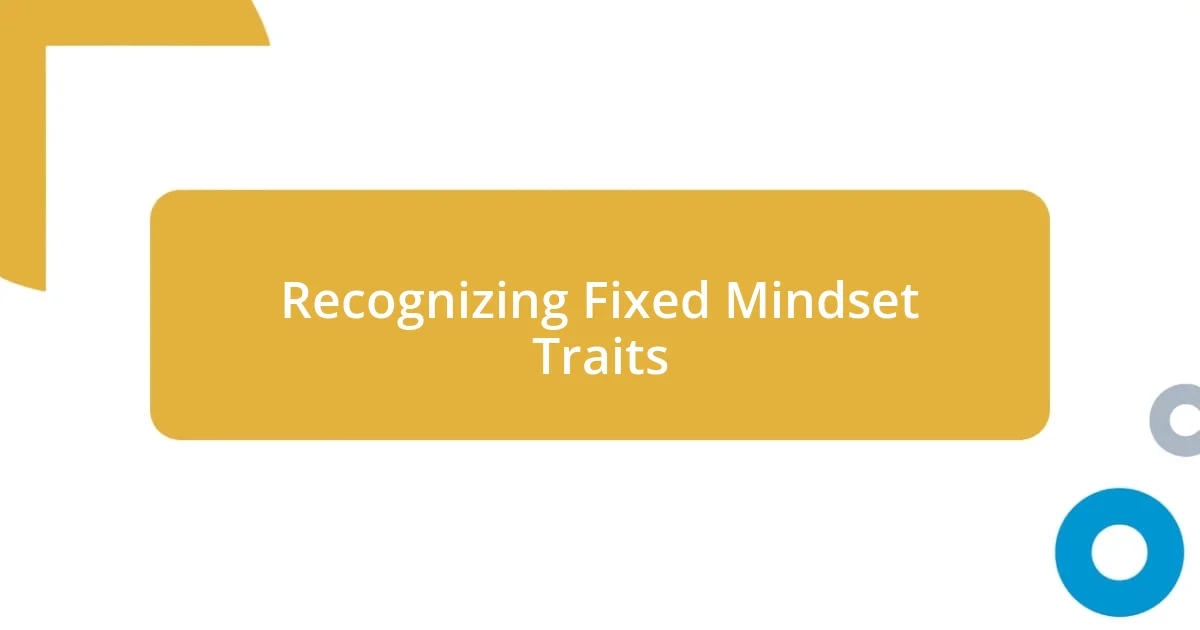
Recognizing Fixed Mindset Traits
Recognizing fixed mindset traits is crucial for anyone looking to foster a growth mindset. I’ve noticed that people often exhibit certain signs that indicate a fixed mindset. For instance, I’ve found that some individuals shy away from challenges or feel threatened by the success of others. These behaviors can quickly create a stagnant environment, devoid of learning and growth.
Here are some common traits associated with a fixed mindset:
- Avoidance of Challenges: They often prefer to stay within their comfort zones and avoid tasks that could lead to failure.
- Fear of Failure: Experiencing failure feels like a personal indictment instead of a learning opportunity.
- Defensiveness: When facing criticism, they react defensively rather than seeking ways to improve.
- Limited Belief in Improvement: There’s a belief that intelligence and talent are static, leading to resignation when faced with difficulties.
I distinctly remember a co-worker who often dismissed new projects, claiming, “I’m just not good at that.” Their reluctance to step outside their familiar tasks not only hindered their growth but also affected team morale. Seeing them miss opportunities for development reminded me just how restrictive a fixed mindset can be. Identifying these traits in ourselves and others helps us challenge those beliefs and open the door to a richer, more expansive perspective on learning.
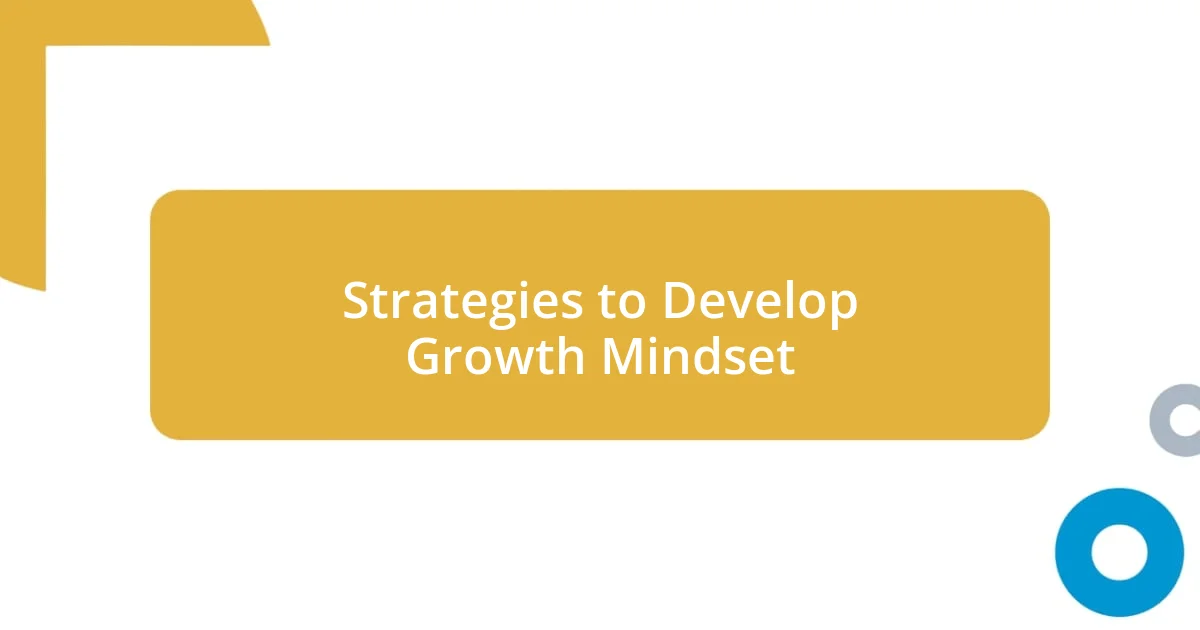
Strategies to Develop Growth Mindset
One effective strategy I’ve embraced to develop a growth mindset is to engage in regular self-reflection. I often set aside time each week to think about my experiences, focusing particularly on what went well and what areas I can improve. Have you ever found that reflecting on your actions helps to clarify your strengths and weaknesses? It does for me, as it encourages a deeper understanding of the lessons learned from both successes and failures.
Another approach I value is the power of positive affirmations. It may sound simple, but I’ve found that telling myself phrases like “I can improve with effort” shifts my perception dramatically. Have you tried it? When I affirmed my capabilities before tackling challenging tasks, such as learning a new language, it paved the way for a persistent attitude, even when progress felt slow.
Lastly, surrounding myself with individuals who embody a growth mindset has been incredibly motivating. Being part of a community that values learning and embraces challenges creates an atmosphere that is electric—it’s contagious! For example, during a recent workshop, I observed how colleagues tackled obstacles with enthusiasm rather than fear. Their eagerness not only inspired me but also reinforced my belief in growth as a continual journey. Do you think your circle influences your mindset? I’ve certainly found this to be true!
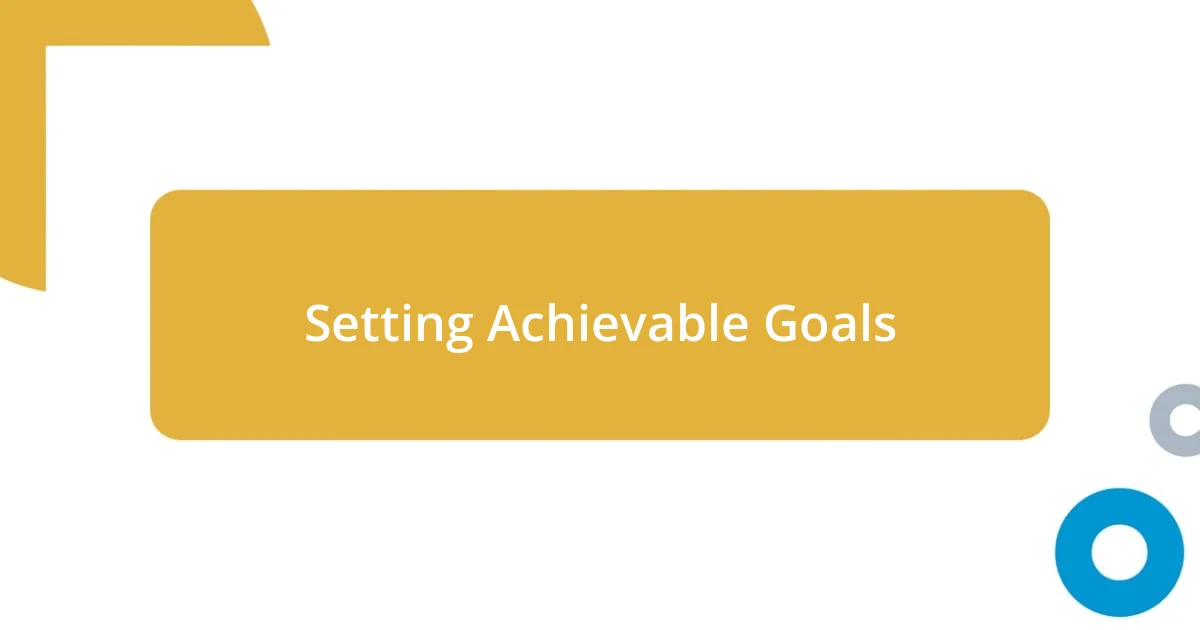
Setting Achievable Goals
Setting achievable goals is vital in fostering a growth mindset. I remember when I decided to improve my public speaking skills. Instead of overwhelming myself by aiming to deliver a keynote speech right away, I broke it down into smaller, manageable steps—like practicing in front of a mirror or joining a local Toastmasters group. These small wins not only built my confidence but also helped me see progress, reinforcing the belief that I could improve over time.
Have you ever set a goal that felt too daunting? I certainly have. When I wanted to run a marathon, I started with a simple goal: running for just 10 minutes a day. The initial success of completing that small task encouraged me to increase my time gradually. Each step forward reminded me that growth doesn’t have to happen overnight—it’s a series of tangible, achievable milestones that keeps us motivated along the way.
It’s essential to align your goals with your personal values. For example, I once aimed to learn a new programming language because I thought it would look good on my resume. However, once I shifted my focus to developing projects that genuinely interest me, the learning process transformed into a thrilling journey. Have you considered how aligning your objectives to what excites you can fuel your progress? When we make our goals meaningful, we’re far more likely to persevere and achieve them.
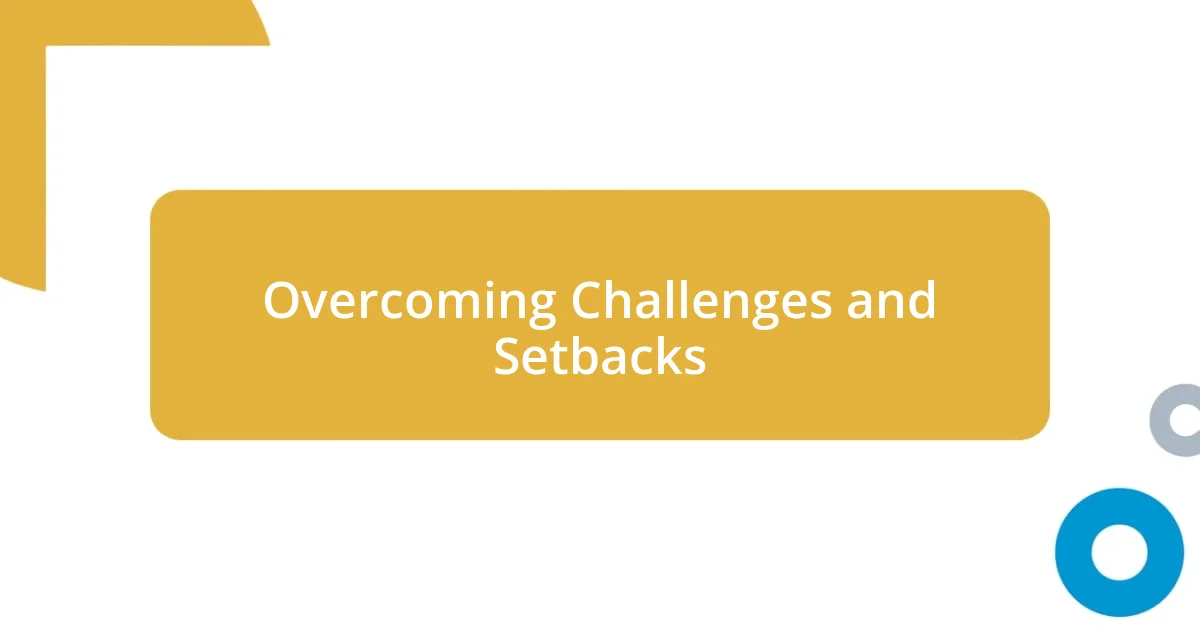
Overcoming Challenges and Setbacks
Overcoming challenges and setbacks is a part of the growth journey, and I’ve always believed that resilience can be cultivated. I remember just a few years ago when I faced a significant setback at work; a project I poured my heart into didn’t meet expectations. Instead of feeling defeated, I took a step back and analyzed what had gone wrong. Have you experienced something similar? It can be tough, but I found that understanding my missteps not only helped me improve my skills but also reinforced my determination to keep pushing forward.
There’s also something powerful about embracing your emotions during tough times. When I once missed an important deadline, I felt a wave of disappointment wash over me. But I allowed myself to feel that frustration. I realized that acknowledging my feelings was an essential step in moving past them. It’s okay to feel down sometimes; in fact, it can serve as a catalyst for change. Have you allowed yourself that space to feel? Trust me, it’s liberating and often leads to valuable insights.
Sometimes, sharing my setbacks with others has led to unexpected support and advice. Last year, after experiencing a professional failure, I confided in a mentor about my feelings of inadequacy. To my surprise, she shared her own stories of failure, which taught me that even the most successful individuals face challenges. It made me realize that setbacks are not signs of weakness but rather opportunities for growth and connection. Have you ever opened up about your challenges? It can lead to incredible revelations and a stronger sense of community.
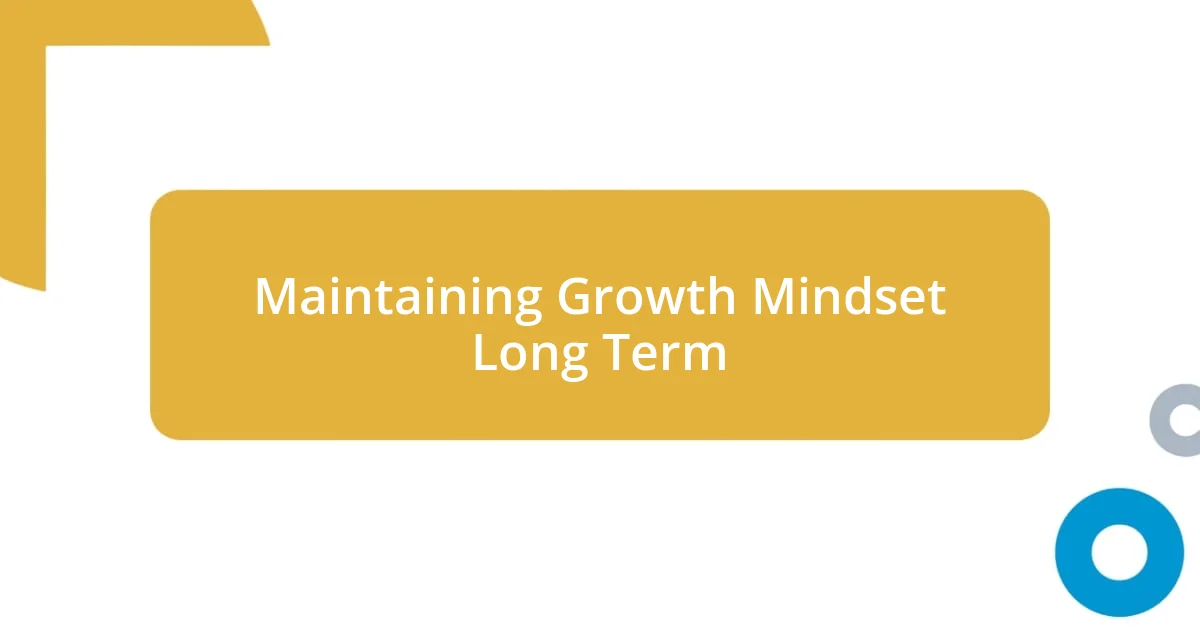
Maintaining Growth Mindset Long Term
Maintaining a growth mindset long-term requires continuous self-reflection and adaptation. I often take time at the end of each week to journal about my experiences and lessons learned. This practice not only helps me commit my growth moments to memory but also allows me to track patterns in my success and areas needing improvement. Have you ever tried reflecting on your week? It’s a great way to stay connected to your journey.
I’ve found that surrounding myself with a supportive community encourages me to maintain my growth mindset. A few months ago, I joined a mastermind group with like-minded individuals, and the accountability has been invaluable. Whenever I feel like giving up, one of them shares a motivating story, which reignites my passion. Have you thought about who you lean on for encouragement? The right people can significantly impact your mindset and resilience.
Lastly, embracing lifelong learning is crucial for sustaining a growth mindset. I recently signed up for an online course that fascinates me—nothing related to my work but something I’ve always wanted to explore. It’s invigorating! When I challenge myself to learn new skills, it serves as a constant reminder that growth is an ongoing process. How do you keep your learning journey alive? Seeking opportunities to expand my knowledge has transformed my view of challenges into exciting adventures.


